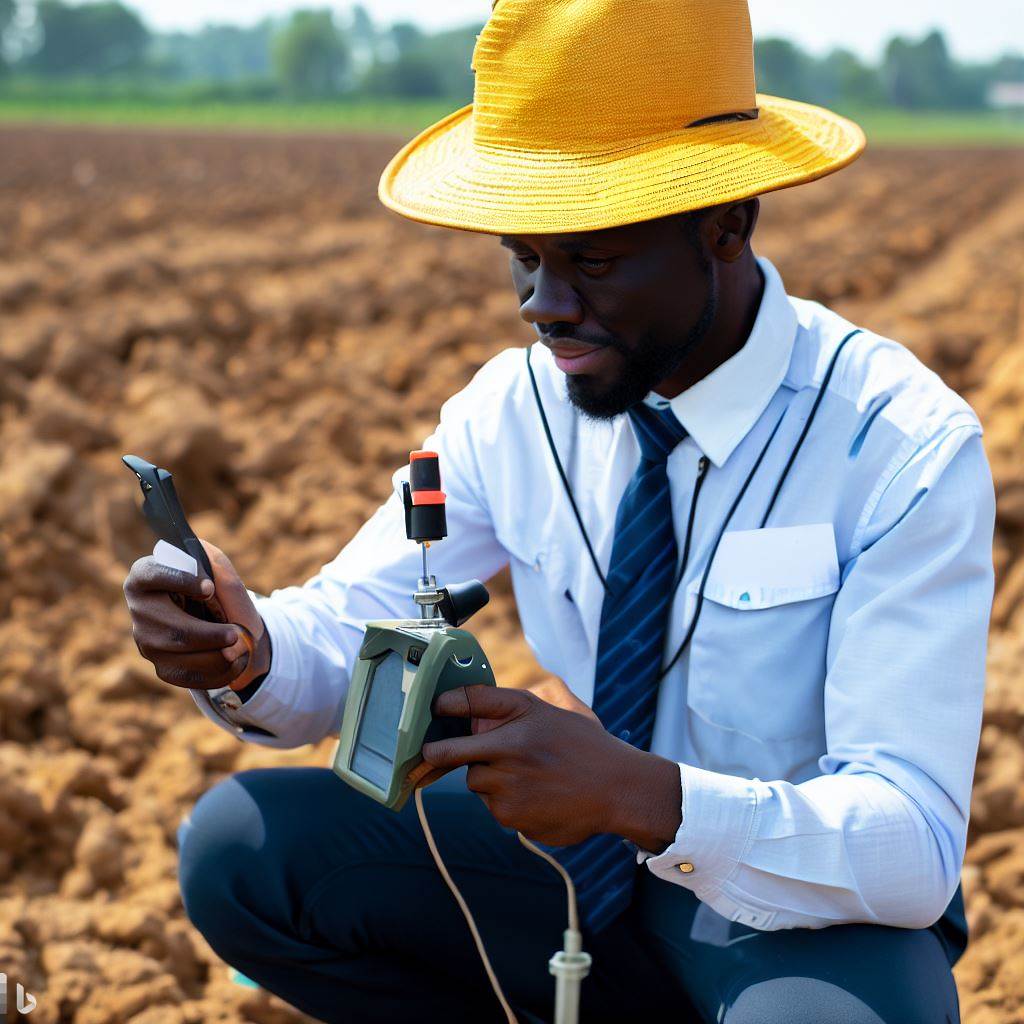Introduction
Climate change refers to long-term shifts in temperature, rainfall patterns, and weather events worldwide.
It has significant global implications, including rising sea levels, extreme weather events, and altered ecosystems.
In Nigeria, climate change has become a pressing issue, with increased temperatures, unpredictable rainfall, and prolonged droughts.
Agriculture is the backbone of Nigeria’s economy, employing a large portion of the population and contributing to the country’s food security.
However, climate change poses a threat to agricultural production, leading to reduced crop yields, livestock losses, and decreased farm income.
Engineers play a crucial role in mitigating the effects of climate change on agriculture in Nigeria.
They develop innovative solutions to enhance irrigation systems, design climate-smart technologies, and implement sustainable farming practices.
Engineering interventions can help farmers adapt to the changing climate and improve their productivity.
The importance of agriculture and engineering in Nigeria’s economy cannot be overstated.
Agriculture contributes significantly to the country’s GDP and provides employment opportunities for millions of people.
Likewise, engineering promotes technological advancements and supports infrastructure development, both essential for economic growth and sustainable development.
In this blog section, we will explore in-depth the effects of climate change on agricultural engineering in Nigeria.
We will examine the challenges faced by farmers, the role of engineering in the adaptation process, and the potential solutions that can be implemented to ensure a resilient agricultural sector.
Stay tuned for the upcoming sections as we delve deeper into this critical topic.
Understanding Climate Change
Climate change refers to long-term shifts in weather patterns and atmospheric conditions that result in significant alterations to the Earth’s climate system.
It is a complex and multifaceted phenomenon with various causes and far-reaching impacts.
Definition of climate change
- Climate change is the long-term alteration of temperature and typical weather patterns in a place.
- It includes shifts in precipitation patterns, extreme weather events, and changes in ecosystems.
Causes and contributing factors
- The primary cause of climate change is the increase in greenhouse gas concentrations in the Earth’s atmosphere.
- Greenhouse gases, such as carbon dioxide (CO2), methane (CH4), and nitrous oxide (N2O), trap heat from the sun.
- Human activities, particularly the burning of fossil fuels and deforestation, have significantly increased greenhouse gas emissions.
Effects of climate change worldwide
- Rising temperatures
- Global temperatures have been increasing over the past century due to the enhanced greenhouse effect.
- Heatwaves have become more frequent and prolonged, posing significant health risks and stressing agricultural systems.
Changing precipitation patterns
- Climate change leads to alterations in rainfall patterns, causing more intense and frequent droughts, floods, and storms.
- Dry regions become drier, affecting water availability for irrigation, while flood-prone areas experience increased risks.
Melting ice and rising sea levels
- Climate change is causing the melting of glaciers and polar ice caps, contributing to rising sea levels.
- This poses threats to coastal communities, increases the risk of flooding, and results in the loss of coastal land and ecosystems.
Impact on agricultural engineering in Nigeria
- Climate change affects agricultural engineering practices in Nigeria as it alters the availability and distribution of water resources.
- Traditional irrigation systems may become insufficient due to changing rainfall patterns and increased water scarcity.
- Agricultural engineers are tasked with developing more efficient irrigation techniques and maximizing water use efficiency.
- Extreme weather events linked to climate change, such as storms and floods, pose risks to infrastructure and agricultural machinery.
- Engineers must design and construct resilient structures and equipment to withstand these conditions.
- Climate change also impacts crop productivity and agricultural practices.
- Warmer temperatures and changes in rainfall patterns may alter planting seasons, affecting crop yields.
- Agricultural engineers play a crucial role in developing and implementing climate-smart agricultural practices, such as precision farming and improved crop varieties.
In essence, understanding climate change is essential to address its far-reaching impacts on agricultural engineering in Nigeria.
It involves comprehending the definition, causes, and contributing factors of climate change, as well as recognizing its effects worldwide.
Agricultural engineers must adapt and innovate in the face of changing climatic conditions to ensure the sustainability and resilience of Nigeria’s agricultural sector.
Read: Examining the Gender Gap in Nigeria’s Agri Engineering
Climate Change in Nigeria
In this section, we will explore the climate patterns in Nigeria and the regional variations observed within the country.
Additionally, we will analyze the impact of climate change on temperature and precipitation in Nigeria, along with the shifts in weather patterns and the occurrence of extreme weather events.
Overview of Nigeria’s Climate Patterns and Regional Variations
- Nigeria is located in West Africa and experiences a tropical climate.
- The country can be broadly categorized into four climatic zones: the Sahel, the Sudan Savannah, the Guinea Savannah, and the coastal region.
- The Sahel zone, in the northernmost part of Nigeria, is characterized by arid conditions and limited rainfall.
- The Sudan Savannah has a moderate climate with distinct wet and dry seasons, experiencing higher rainfall than the Sahel zone.
- The Guinea Savannah also has a pronounced wet and dry season, with more rainfall than the Sudan Savannah.
- The coastal region, located along the Atlantic Ocean, has a tropical rainforest climate with ample and consistent rainfall throughout the year.
- These regional variations in climate result in different agricultural practices and suitability for various crops.
Impact of Climate Change on Temperature and Precipitation in Nigeria
- Climate change has led to rising temperatures throughout Nigeria, affecting agri-engineering practices.
- Higher temperatures can influence crop growth, nutrient availability, and increase the risk of pests and diseases.
- Extreme heat can also cause heat stress in livestock, affecting their productivity and overall health.
- Precipitation patterns have also been disrupted, with some areas experiencing decreased rainfall while others face increased variability.
- This imbalance in water availability affects irrigation practices and creates challenges for farmers relying on rainfed agriculture.
Shifts in Weather Patterns and Extreme Weather Events
- Climate change has caused shifts in weather patterns, leading to irregular and unpredictable weather conditions.
- Seasonal rains might start later, end earlier, or intensify within shorter timeframes, impacting crop planting and harvesting schedules.
- Increased frequency and intensity of extreme weather events, such as droughts, floods, and storms, pose significant challenges to agricultural practices.
- Droughts can lead to water scarcity, crop failures, and loss of livestock, while floods can destroy crops, contaminate water sources, and cause soil erosion.
- These extreme events have severe socio-economic implications, impacting food security and livelihoods of farming communities.
Adapting to these changing climate conditions and their impact on agri-engineering practices is crucial for sustainable agricultural development in Nigeria.
Efforts should focus on implementing climate-smart technologies, promoting efficient irrigation systems, and developing climate-resilient crop varieties.
Additionally, enhancing farmers’ capacities through training and access to information on climate predictions can further support resilience and minimize the adverse effects caused by climate change.
Read: Postgraduate Opportunities in Agricultural Engineering
Agriculture in Nigeria
Agriculture plays a crucial role in Nigeria’s economy, serving as a major source of employment and income.
It contributes significantly to the country’s gross domestic product (GDP) and provides sustenance for the growing population.
In this section, we will explore the importance of agriculture in Nigeria, the types of crops grown and livestock raised, and the role of agricultural engineering in enhancing agricultural productivity.
Importance of agriculture in Nigeria’s economy
- Employment Generation: Agriculture is the largest employer of labor in Nigeria, providing jobs for millions of people, especially in rural areas.
- Food Security: Agriculture is a key sector in ensuring food self-sufficiency and reducing the country’s dependence on imported food.
- Foreign Exchange Earnings: The exportation of agricultural products such as cocoa, oil palm, and cashew nuts contributes to Nigeria’s foreign exchange earnings.
- Poverty Reduction: By increasing agricultural productivity and income levels, agriculture has the potential to lift many Nigerians out of poverty.
- Rural Development: Agriculture plays a crucial role in the development of rural areas by providing income opportunities and improving infrastructure.
Types of crops grown and livestock raised in Nigeria
Crops
- Cash Crops: Nigeria is one of the largest producers of cocoa, cashew nuts, rubber, and oil palm in the world.
- Food Crops: Staple crops like rice, maize, millet, sorghum, yam, and cassava are widely cultivated across the country.
- Export Crops: Apart from cocoa and cashew nuts, Nigeria also exports sesame seeds, groundnuts, and beans.
Livestock
- Cattle: Nigeria has a significant number of cattle, especially in the northern part of the country, where they are raised for meat and dairy production.
- Poultry: Poultry farming, including chicken, turkey, and guinea fowl, is a thriving livestock sector in Nigeria.
- Fish: With vast water resources, Nigeria’s fishery industry is important for both domestic consumption and export.
Role of agricultural engineering in enhancing agricultural productivity
- Mechanization: Agricultural engineering plays a vital role in developing and deploying machinery and equipment for various farming activities, such as planting, harvesting, and threshing.
- Irrigation Systems: Agricultural engineers design and implement efficient irrigation systems to combat the effects of climate change and ensure agricultural productivity in arid and semi-arid regions.
- Post-Harvest Processing: Agricultural engineering helps in establishing modern processing facilities for crops and livestock products, reducing post-harvest losses and increasing value addition.
- Soil and Water Conservation: Agricultural engineers promote sustainable farming practices through the design and construction of terraces, contour bunds, and water storage structures to control soil erosion and conserve water resources.
- Renewable Energy: Agricultural engineering incorporates renewable energy sources, such as solar-powered irrigation systems and biomass technologies, to reduce reliance on fossil fuels and promote sustainable farming practices.
In summary, agriculture is of utmost importance to Nigeria’s economy.
It provides employment, ensures food security, generates foreign exchange earnings, and contributes to poverty reduction and rural development.
The country cultivates a wide range of crops and raises various livestock, meeting both domestic and international demand.
Agricultural engineering plays a critical role in enhancing agricultural productivity through mechanization, irrigation systems, post-harvest processing, soil and water conservation, and the integration of renewable energy sources.
Read: Agricultural Engineer: Day in the Life in Nigeria

Effects of Climate Change on Agriculture in Nigeria
In recent years, Nigeria has been experiencing the adverse effects of climate change, particularly on its agricultural sector.
These changes in climate patterns have had significant implications on the practice of agricultural engineering in the country. Here are some of the key effects:
Decreased Crop Yields and Quality
- Changing weather patterns, such as irregular rainfall and prolonged droughts, have resulted in decreased crop yields.
- Extreme temperatures have negatively impacted crop productivity and compromised the quality of harvested crops.
- The unpredictability of climate conditions has made it challenging for farmers to plan and optimize their farming practices.
Increased Pest and Disease Outbreaks
- Warmer temperatures and altered precipitation patterns have contributed to the proliferation of pests and diseases in agricultural systems.
- Insect pests, fungi, and bacteria find favorable conditions to thrive, causing devastating effects on crops and livestock.
- This increase in pest and disease outbreaks has required agricultural engineers to develop innovative and sustainable solutions to combat these challenges.
Irrigation and Water Management Challenges
- Changing rainfall patterns and unpredictable water availability have made irrigation and water management increasingly difficult.
- Farmers often struggle with water scarcity, especially during prolonged dry seasons, resulting in reduced crop yields and economic losses.
- Agricultural engineers are playing a crucial role in designing and implementing efficient irrigation systems and water conservation practices.
Loss of Farmland and Agricultural Biodiversity
- Climate change has led to the degradation of arable land and the loss of agricultural biodiversity in Nigeria.
- Soil erosion, desertification, and flooding have contributed to the shrinking of cultivable land areas.
- As a result, farmers face difficulties in finding suitable land for farming, and the nation’s agricultural diversity is at risk.
In addition, climate change has had significant effects on agricultural engineering in Nigeria.
The decreased crop yields and quality, increased pest and disease outbreaks, irrigation and water management challenges, and loss of farmland and agricultural biodiversity are all serious concerns requiring immediate attention.
It is crucial for agricultural engineers, policymakers, and farmers to work in tandem to mitigate these effects and develop sustainable strategies that can help ensure food security and safeguard the future of agriculture in Nigeria.
Read: Challenges Facing Agricultural Engineering in Nigeria
Effects of Climate Change on Agri Engineering in Nigeria
- Increased demand for climate-smart techniques and technologies: Climate change drives demand for resilient agric engineering techniques and technologies, adapting to unpredictable weather patterns.
- Need for innovative engineering solutions for irrigation and water management: Innovative engineering solutions for efficient irrigation and water management are essential for sustainable agriculture.
- Adaptation strategies for sustainable agriculture and engineering practices: Agri engineering must adopt adaptive strategies to mitigate climate change impacts on agriculture.
- Integration of climate data and modeling in agri engineering: Integrate climate data and modeling for informed decision-making in agri engineering practices.
- Promotion of precision agriculture: Promote precision agriculture using remote sensing and data analytics to optimize resource use.
- Introduction of climate-resilient crop varieties: Develop climate-resilient crop varieties to ensure food security in adverse climatic conditions.
- Design and implementation of climate-smart infrastructure: Design climate-smart infrastructure like farm ponds and water storage facilities to combat water scarcity.
- Capacity building for agri engineers: Capacity building for agri engineers through training programs on sustainable practices.
- Collaboration between agri engineers and farmers: Collaborate with farmers to develop context-specific engineering solutions meeting local needs.
- Policy support and funding for climate-smart agri engineering: Policy support and funding for climate-smart agri engineering to drive research and implementation.
As climate change poses unprecedented challenges to agriculture in Nigeria, the field of agri engineering must continuously adapt and innovate to mitigate the negative impacts and ensure sustainable agricultural practices.
By embracing climate-smart techniques and technologies, developing innovative solutions, and integrating climate data and modeling, agri engineers can contribute significantly to climate change adaptation and promote resilient agriculture in Nigeria.
Challenges and Opportunities
Obstacles Faced by Agri Engineering in Nigeria due to Climate Change
- Rising temperatures negatively affect crop productivity, leading to reduced food production.
- Increased water scarcity due to irregular rainfall patterns affects irrigation systems.
- Erosion caused by heavy rainfall erodes fertile soil, posing a threat to agriculture.
- Changing pest and disease patterns require innovative engineering solutions to protect crops.
- Extreme weather events like floods and droughts damage agricultural infrastructure.
- Lack of access to advanced agricultural machinery limits productivity and efficiency.
- Inadequate knowledge and training among agri engineers on climate change adaptation measures.
- Limited funding and investment in agri engineering projects to mitigate climate change impacts.
- Poor coordination between agricultural and engineering sectors in implementing climate-resilient solutions.
- Inefficient waste management systems contribute to environmental degradation and agricultural challenges.
Potential Opportunities for Growth and Development in the Sector
- Development of climate-smart agricultural machinery to enhance adaptation to changing conditions.
- Innovative irrigation techniques like drip irrigation and hydroponics can mitigate water scarcity.
- Promotion of renewable energy solutions to power agricultural machinery and reduce emissions.
- Integration of precision farming technologies to optimize resource use and increase yields.
- Engaging youth in agri engineering through capacity building programs and entrepreneurship initiatives.
- Exploring the use of drones and remote sensing for data collection and monitoring of agricultural systems.
- Promotion of sustainable practices like organic farming and agroforestry for climate resilience.
- Investment in research and development to develop climate-resilient crop varieties.
- Establishment of public-private partnerships to leverage resources for agri engineering projects.
- Creation of platforms for knowledge-sharing and collaboration among stakeholders in the sector.
Importance of Collaboration Between Agricultural and Engineering Sectors
Collaboration between agricultural and engineering sectors is critical for addressing the challenges posed by climate change and harnessing the opportunities for agri engineering’s growth and development.
The agricultural sector provides valuable insights into the specific needs and challenges faced by farmers, while the engineering sector brings technological expertise and innovation to develop climate-resilient solutions.
By working together, these sectors can develop customized agricultural machinery, irrigation techniques, and farming practices that are adapted to changing climate conditions.
Collaborative efforts can also enhance knowledge sharing, capacity building, and the integration of new technologies in agriculture, leading to increased productivity, resource efficiency, and sustainability.
Furthermore, joint research and development initiatives can help in the creation of resilient crop varieties that can withstand climate extremes, pests, and diseases.
Essentially, the challenges faced by agri engineering in Nigeria due to climate change can be overcome through a collaborative approach, which unlocks the potential opportunities for growth and development in the sector.
By addressing these challenges and capitalizing on the opportunities, agri engineering can play a crucial role in ensuring food security, boosting farmer livelihoods, and contributing to the sustainable development of Nigeria’s agricultural sector.
Case Studies
Examples of successful agri engineering projects in Nigeria addressing climate change
- The use of irrigation systems in Kano State has increased crop yields and reduced dependence on rainfall.
- The construction of hydroponic greenhouse systems in Lagos has allowed for year-round cultivation of high-value crops.
- The adoption of precision agriculture techniques in Ogun State has enhanced resource management and improved productivity.
Best practices and lessons learned from these projects
- Integrating climate-resilient infrastructure, such as rainwater harvesting systems, into agri engineering projects.
- Incorporating renewable energy sources, such as solar-powered irrigation systems, to reduce carbon emissions.
- Promoting the use of climate-smart technologies, such as drip irrigation and soil moisture sensors, to optimize water usage.
- Enhancing capacity building and knowledge exchange between farmers and agri engineers to promote sustainable practices.
- Encouraging the adoption of climate-smart crop varieties that are more resilient to changing weather patterns.
- Establishing effective monitoring and evaluation systems to assess project impacts and identify areas for improvement.
- Implementing holistic approaches that consider the socio-economic factors affecting farmers’ ability to adapt to climate change.
- Collaborating with local communities, researchers, and policymakers to ensure project sustainability and scalability.
These case studies showcase successful agri engineering projects in Nigeria addressing climate change challenges.
- Irrigation systems in Kano State reduce crop losses during drought periods and optimize irrigation scheduling based on weather patterns.
- Hydroponic greenhouse systems in Lagos enable year-round cultivation of fresh produce, protected from extreme weather events and pests.
- Precision agriculture techniques in Ogun State improve resource management using satellite imagery and soil sensors.
Lessons learned from these projects
- Climate-resilient infrastructure like rainwater harvesting mitigates water scarcity challenges.
- Renewable energy sources, such as solar-powered irrigation systems, reduce greenhouse gas emissions.
- Climate-smart technologies like drip irrigation optimize water usage, minimizing stress and water losses.
Capacity building through farmer-agri engineer knowledge exchange enhances project sustainability and effectiveness.
These projects bolster agricultural productivity and strengthen farming communities’ resilience against climate change. By promoting best practices and innovative approaches, Nigeria can ensure sustainable agriculture and food security.
Policy Recommendations and Solutions
- Government policies and regulations play a crucial role in supporting the agri engineering sector.
- There is a need for investment in research and development of climate-resilient technologies.
- Engagement of farmers and local communities in decision-making processes is essential.
Climate change’s effects on Nigerian agriculture necessitate effective policies and solutions
- Government support is crucial in agri engineering through favorable policies and regulations.
- Prioritize climate-resilient technologies by investing in research and development.
- Engage farmers and local communities in decision-making for effective outcomes.
- Implement capacity building initiatives to empower farmers with knowledge and skills for climate adaptation.
- Foster collaboration between government agencies, research institutions, farmers, and local communities.
Addressing climate change requires government support, investment in research, and engaging farmers for sustainable agriculture.
Read: Universities Offering Robotics Engineering in Nigeria
Conclusion
Finally, the effects of climate change on agri engineering in Nigeria are significant.
The increasing temperatures, erratic rainfall patterns, and extreme weather events have posed numerous challenges to the agriculture and engineering sectors in the country.
It is essential to recognize the interconnectedness between climate change, agriculture, and engineering in Nigeria.
The impacts of climate change on agriculture directly affect the engineering processes involved in farming, irrigation systems, and infrastructure development.
To mitigate the effects of climate change on agri engineering in Nigeria, sustainable practices and innovative solutions are crucial.
Implementing climate-smart agricultural techniques, such as using efficient irrigation systems and adopting climate-resilient crop varieties, can help reduce vulnerability.
Moreover, there is a need for increased investment in research and development of climate-adaptive engineering solutions.
This includes designing infrastructure that can withstand extreme weather conditions, such as flooding and droughts.
A call to action is necessary for stakeholders, including government agencies, agricultural professionals, and engineers, to collaborate and prioritize sustainable practices and innovative solutions.
This will ensure the resilience of the agriculture sector and the overall development of Nigeria’s engineering capabilities.
By recognizing the effects of climate change on agri engineering in Nigeria and taking proactive measures, we can minimize the negative impacts and build a more sustainable future for agriculture and engineering in the country.
Let us embrace sustainability and prioritize innovative solutions to secure a prosperous and resilient future.




